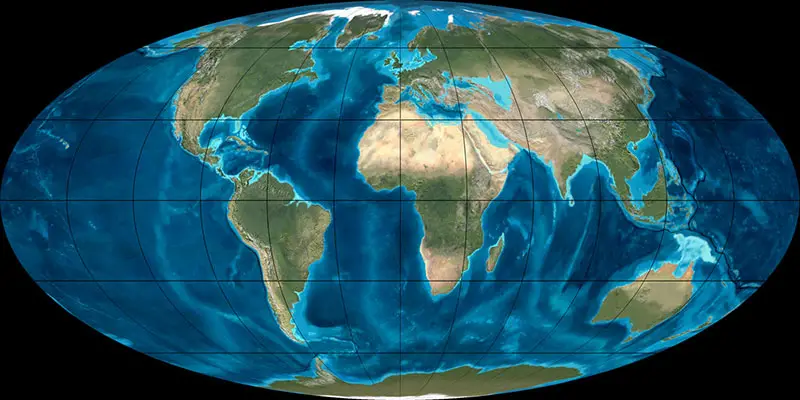†Pliopithecidae
Pliopithecidae ist der Familienname von 31 Primaten, die ab dem frühen Miozän vor 23,03 Millionen Jahren bis vor 5,333 Millionen Jahren lebten. Viele Überreste wurden in China gefunden.
| Physiologie | |
|---|---|
| Gewicht: | ? |
| Schwestertaxa | |
Literatur
H. Zapfe 1961, Ein Primatenfund aus der Molasse von Oberoesterreich. Paläontologische Zeitschrift. 35:1-2, p.L. Ginsburg 1964, Les mammiferes fossiles recoltes a Sansan au cours du XIXe siecle. Bulletin de la Societe geologique de France. 5:1, p. 3 - 15
C. Li, Y. Lin, Y. Gu, L. Hou, W. Wu, Z. Qiu 1983, The Aragonian vertebrate fauna of Xiacaowan, Jiangsu. Vertebrata PalAsiatica. 21:4, p. 313 - 327
R. Wu, Y. Pan, Y. Gu, L. Hou, W. Wu, Z. Qiu 1984, A late Miocene Gibbon-like Primate from Lufeng, Yunnan Province. Acta Anthropologica Sinica (Renleixue xuebao). 3:3, p. 185 - 194
R. Wu, Y. Pan, Y. Gu, L. Hou, W. Wu, Z. Qiu 1985, A new Adapid Primate from the Lufeng Miocene, Yunnan. Acta Anthropologica Sinica (Renleixue xuebao). 4:1, p. 1 - 6
K. Heissig, Y. Pan, Y. Gu, L. Hou, W. Wu, Z. Qiu 1989, Neue Ergebnisse zur Stratigraphie der mittleren Serie der Oberen Süßwassermolasse Bayerns (New results on the stratigraphy of the middle series of upper Freshwater Molasse, Bavaria). Geologica Bavarica. 94:1, p. 239 - 257
K. Kowalski, Y. Pan, Y. Gu, L. Hou, W. Wu, Z. Qiu 1990, Stratigraphy of Neogene mammals in Poland. In E.H. Lindsay, V. Fahlbusch and P. Mein, eds., European Neogene Mammal Chronology, Plenum Press, New York. :1, p. 193 - 209
T. Harrison, E. Delson, J. Guan 1991, A new species of Pliopithecus from the middle Miocene of China and its implications for early catarrhine zoogeography. Journal of Human Evolution. 21:5, p. 329 - 361
Th. Bollinger, E. Delson, J. Guan 1992, Kleinsäugerstratigraphie in der miozänen Hörnlischüttung (Ostschweiz); (Biostratigraphy of small mammals in the Hörnlischüttung of Miocene age (East Switzerland)). Documenta naturae. 75:5, p. 1 - 296
T. Mors, F. Hocht, B. Wutzler 2000, Die erst Wirbeltierfauna aus der miozanen Braunkohle der Niederrheinischen Bucht (Ville-Schichten, Tagebau Hambach) [The first vertebrate fauna from the Miocene Ville Series of the Lower Rhine Embayment (Hambach open cast mine, western Germany)]. Paläontologische Zeitschrift. 74:1/2, p. 145 - 170
S. Moyà‐Solà, M. Köhler, D. Alba 2001, Egarapithecus narcisoi, a new genus of Pliopithecidae (Primates, Catarrhini) from the Late Miocene of Spain. American Journal of Physical Anthropology. 114:1/2, p. 312 - 324
M. Augé, L. Ginsburg, F. L. de Broin, M. Makinsky, C. Mourer, D. Poiut, S. Sen 2002, Les vertébrés du Miocène moyen de Contres (Loir-et-Cher, France). Revue de Paléobiologie. 21:2, p. 819 - 852
M. Sabol, P. Holec, F. L. de Broin, M. Makinsky, C. Mourer, D. Poiut, S. Sen 2002, Temporal and spatial distribution of Miocene mammals in the western Carpatians (Slovakia). Geologica Carpathica. 53:4, p. 269 - 279
R. L. Bernor, L. Kordos, L. Rook et al. 2004, Recent Advances on Multidisciplinary Research at Rudabánya, Late Miocene (MN9), Hungary: a compendium. Palaeontographia Italica. 89:4, p. 3 - 36
C. Gagnaison, J.-C. Gagnaison, J.-P. Harmann 2009, Les fossiles de mammifères miocènes de la colletion de J.-P. Hartmann conservés dans le Musée du Savignéen. Symbioses. 23:4, p. 1 - 16
D.M. Alba, S. Moyà-Solà, J.-P. Harmann 2012, A New Pliopithecid Genus (Primates: Pliopithecoidea) From Castell de Barberà (Vallès‐Penedès Basin, Catalonia, Spain). American Journal of Physical Anthropology. 147:1, p. 88 - 112
C. Gagnaison, S. Moyà-Solà, J.-P. Harmann 2017, Le site paléontologique du Grand Morier (Pont-Boutard, Indre-et-Loire, France): contexte géologique et détail biostratigraphique des formations cénozoïques à partir des assemblages de vertébrés fossiles. Geodiversitas. 39:2, p. 251 - 271, DOI: 10.5252/g2017n2a5
